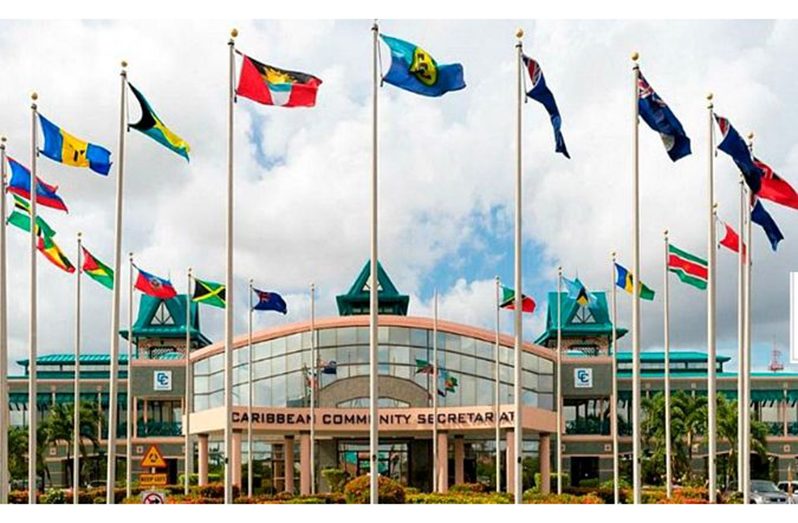— expresses concern over Venezuela’s latest decree
IN light of Venezuela’s recent claims to the seas and seabed adjacent to the coast west of the Essequibo River, which belong to Guyana, the Caribbean Community (CARICOM) has reiterated its firm and unswerving support for the maintenance and preservation of the sovereignty and territorial integrity of its sister nation, Guyana.
A recent decree and subsequent statements by Venezuela regarding that country’s border controversy with Guyana, have ‘deeply’ disappointed CARICOM and caused concern among member states since this regional bloc holds firm the view that Guyana’s sovereignty must be respected and preserved.
President of Venezuela, Nicolás Maduro, on January 7, 2021, issued a decree claiming Venezuela’s sovereignty and exclusive sovereign rights in the waters and seabed adjacent to Guyana’s coast, west of the Essequibo River.
“The Caribbean Community (CARICOM) is deeply disappointed and concerned at the decree and subsequent statements by Venezuela with respect to that country’s border controversy with Guyana, including intimations of the creation of a strategic area of national development called Territory for the Development of the Atlantic Façade,” the regional bloc said in a statement on Tuesday.
Based on reports emanating from Venezuela, the decree points to the creation of a strategic zone for national development called the “Territory for the Development of the Atlantic Façade”, which the Bolivarian Republic envisages will provide adequate protection and safeguard its jurisdiction.
However, since Guyana has sovereign rights over the coast west of the Essequibo River, as far as Punta Playa, it follows, consequently, that only Guyana can enjoy sovereignty and exclusive sovereign rights over the adjacent sea and seabed.
This is precisely the issue that is before the International Court of Justice (ICJ), and which, on December 18, 2020, the ICJ decided to resolve, i.e., whether Guyana or Venezuela has sovereignty over that territory.
It was reported that Guyana is confident that the international court will resolve the issue in its favour, and that this will also settle the issue of maritime rights in the adjacent sea and seabed. But, under international law, this is now for the ICJ to decide.
This judicial process is one which CARICOM supports, since the regional bloc believes that it is intended to bring a peaceful and definitive end to the long-standing controversy between the two countries.
PELLUCID
Even though CARICOM supports the ongoing judicial process, it was pellucid that any acts of aggression by Venezuela against Guyana will be rejected.
Both Canada and the United States of America (U.S.) have also called on Venezuela to respect this judicial process.
The Canadian High Commission, in a statement posted on its Facebook page on Monday, stated that Venezuela’s recent claim that it has sovereignty over the area adjacent to Guyana’s Essequibo coast is concerning.
“The decision is in the hands of the International Court of Justice, and this judicial process must be respected,” the High Commission said.
Assistant Secretary (ag) of the US Department of State’s Bureau of Western Hemisphere Affairs, Michael Kozak said, last Sunday, that the U.S. supports the ICJ’s ruling that it has jurisdiction in the Guyana, Venezuela territorial border issue, which is the legal and peaceful way forward.
“Maduro’s aggressive claims don’t change this; they only show the world his disregard for his neighbours and international law,” Kozak asserted in a post on his official Twitter page.
Also, U.S. Ambassador to Guyana, Sarah-Ann Lynch, reiterated the North American country’s call for a legal, peaceful resolution to the border controversy.
1899 ARBITRAL AWARD
“I remind that sovereignty over this coast, and the land territory to which it is attached, were awarded to Guyana (then British Guiana) in the 1899 Arbitral Award, whose validity and legally binding character Guyana is confident the International Court of Justice (ICJ) will uphold unequivocally,” President, Dr. Irfaan Ali affirmed in an address to the nation on Saturday.
He said that regrettably, by decreeing that the seas adjacent to this territory belong to Venezuela, at least two fundamental principles of international law have been violated.
In the first violation, as outlined by President Ali, no State can unilaterally determine its international boundaries, whether land or maritime.
President Ali contended that the fixing of an international boundary under international law can only result from an agreement between neighbouring States, or a binding determination by an international court or arbitral tribunal.
“Therefore, this attempt by Venezuela to attempt, unilaterally, to fix both its land and maritime boundaries with Guyana is a legal nullity, which cannot, and will not, be respected by any other State in the world, including Guyana,” the Head of State affirmed.
The second violation of fundamental international law referenced by President Ali is based on the fact that under well-established rules of international law, there is a fundamental principle that says, “the land dominates the sea”.
This means that sovereignty, and sovereign rights in the sea and seabed emanate from title to the land that forms the coast to which those seas and seabed are adjacent.











